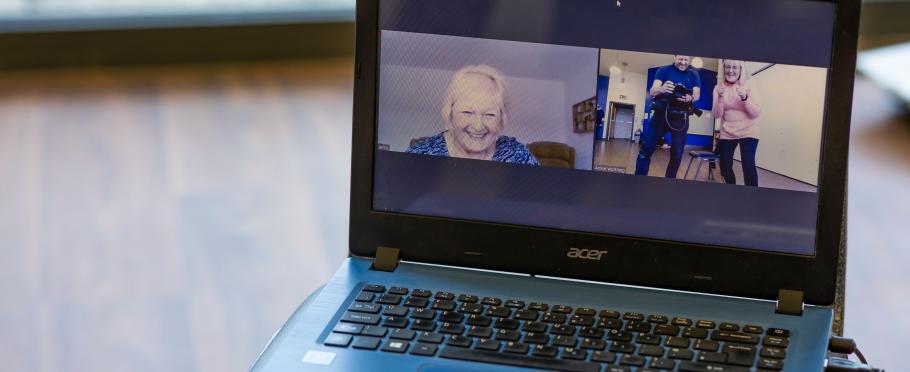By Penny Vicary (Public Contributor) in conversation with Elspeth Mathie (Co-lead Inclusive Involvement in Research Theme: NIHR Applied Research Collaboration, East of England). Penny does not have access to the internet and continues to reflect on the impact of digital exclusion for Public Involvement in Research.
May 2022 (blog number 3).
In February 2022, Penny and I finally met face to face to discuss public involvement during COVID. It was wonderful to be able to chat again over tea and cake. Penny does not use the internet and speaks as one of the 6.3% who have never used the internet or the 8% who are not recent users [1]. A recent review suggests that there is “good evidence to believe that many groups who are already subject to disadvantage and worse health outcomes are subject to digital exclusion” [2. p.1]. A similar viewpoint in the Lancet Digital Health argues that creating a digital health divide may exacerbate existing health-care inequalities [3].
Reflections on involvement and research over the past two years during COVID
Penny “There are numerous issues, surrounding access, of who is involved in ‘public involvement in research’ (and who is not) and my concern is that some of the knowledge and wisdom of the members of the public who have not be involved over the last 2 years has been lost. They have not been able to do their role, not able to influence research and not able to make researchers accountable. People have not been there, not visible and because of that you are not getting the diversity, because everyone has been online. I want to strike a note of caution as this does not mean fair representation or that diversity and inclusivity is somehow sorted, as some of the people (like me) who would have provided that experiential lived experience of the impact of technology and data poverty which brings lack of choices, are not there. We are not there to observe the research activity, or to complement other PPI contributors, who may not understand, recognise or feel the need to reflect on the challenges of how this form of diversity marginalises parts of society, in all aspects of day to day life; and where a person’s agency becomes diminished, a voice is lost.
Why are we there as public contributors? We are members of the public and patients, but they cannot all be there during the research process, we (as Public Involvement contributors) have to be there for them. I feel I have an obligation, as a collective with my colleagues, and I complement the other people, I come from a rural environment, lack of economic independence, living with a chronic condition and I do not use the internet. Those who have health inequalities, live in areas with low internet usage are exactly the people who funders want to be included in research.
The public have a right to know study results
One recent example is the dissemination of results to participants taking part in a research study. It is easy for public members (who are on-line) to agree to dissemination on-line, by putting the results on a website or creating a video. However, this choice of dissemination means the study results will not get to every participant via their choice of format (paper, email or both or via a webpage). Dissemination of results is a minimum and a curtesy, it is part of the full research circle.
Dissemination is often forgotten because it comes at the end of research, when researchers are leaving, moving to another contract and funding is running out. However, as public contributors I believe it is our duty to remind researchers that they have an obligation to feedback the study results to the participants. In one study I was involved in, I made sure that the dissemination of the findings was actioned and written into the protocol. This meant that the researchers were then reminded of their obligation to the public. By putting it into the protocol it makes the institution and academic community accountable. Someone in the research team has to take responsibility for checking consent forms, retaining databases of contacts until the end of a study (maybe 5 years down the line) so that those who took part can understand what happened to their data. Funders want to know if the protocol has been met and this is one way to ensure dissemination.
Researchers and public members must remember that the public should be offered a lay summary at the very least and access to the full report. People should be offered a choice, as to what format they would like to receive the findings. The researchers must not forget all the people who have given them data, as without that sample they would not have a study. Getting the results to the participants is just as important, if not more important than publishing in the British Medical Journal or Nature. If people hear their contribution has been part of research findings, they may be more motivated to take part in further studies. It may also create a wider interest in research and ultimately more public involvement.
I also believe that Public Involvement should remain on the agenda of all research projects, so that we have the opportunity to raise issues and that these are then written into the minutes. If dissemination is written into the minutes, again, it is easier for public members to go back and remind the researchers later. I am not there to challenge or confront but to remind on behalf of those members of the public who cannot be there.
People may now be more aware of research due to recent COVID studies, many have taken part and been offered incentives to take part. We may be coming more aware of research studies, but perhaps not to our rights around our data. The opting out of data was largely through the internet and many people will not know they have a right to know the results of studies being carried out with their data. I have been encouraging friends who have taken part in studies, to ask for results and ask about possible further involvement. Public members can be active partners in the research process.
As public contributors, with our inside knowledge of research, I believe we need to be the critical friends to researchers and to members of the public to remind them of their rights to know research results. There is also a big push to achieve a more diverse, or wider breadth of people involved in research, both as participants, as well as public involvement members. So, I would make a plea to not forget those of us who do not use the internet and to understand and appreciate the complex reasons why, in order to give us agency to be involved in a meaningful way, that gives not only value to the research but to us as people.
Footnote:
Penny Vicary has written two previous blogs ‘Why people should be involved who do not use the internet’ (July 2020) and ‘Offer choice don’t let Zoom become the default’ (Feb 2021). Our previous research made a strong plea to researchers to feedback to Public Involvement contributors [4] and now this needs to include participants [5] in accessible and varied formats.
See #MakeItPublic
References
[1] https://www.ons.gov.uk/businessindustryandtrade/itandinternetindustry/bulletins/internetusers/2020
[2] Honeyman M, Maguire D, Evans H and Davies A. (2020) Digital technology and health inequalities: a scoping review. Cardiff: Public Health Wales NHS Trust
[3] Ibrahim H, Xiaoxuan L, Zariffa N, Morris D and Dennison, A.K. (2022) Health Data Poverty: an assailable barrier to equitable digital health care, Viewpoint, Lancet Digital Health, 3: e260-65. https://doi.org/10.1016/S2589-7500(20)30317-4
[4] Mathie E, Wythe H, Munday D, Millac P, Rhodes G, Roberts N, Smeeton N, Poland F, Jones J. Reciprocal relationships and the importance of feedback in patient and public involvement: A mixed methods study. Health Expect. 2018 Oct;21(5):899-908. https://doi.org/10.1111/hex.12684
[5] Long, C.R., Stewart, M.K. & McElfish, P.A. Health research participants are not receiving research results: a collaborative solution is needed. Trials 18, 449 (2017). https://doi.org/10.1186/s13063-017-2200-4

